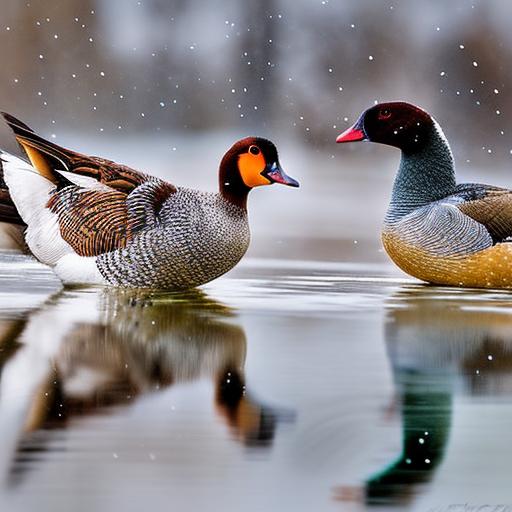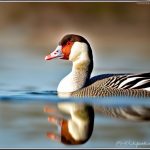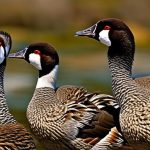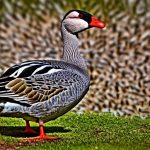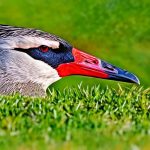Keeping geese in winter can be a rewarding and enjoyable experience. Geese are often kept during the winter season for various reasons, including meat production, egg production, or simply as pets. However, it is important to provide proper care and management during this time to ensure the health and well-being of the geese.
Proper care and management during the winter season is crucial for geese. The cold weather can be harsh on these birds, and without proper shelter, feeding, and water management, they can suffer from various health issues. It is important to understand the specific needs of geese during winter and take appropriate measures to meet those needs.
Key Takeaways
- Keeping geese in winter requires proper preparation and care to ensure their health and well-being.
- A suitable winter shelter for geese should be well-insulated, dry, and protected from wind and drafts.
- Feeding geese during winter requires a balanced diet of grains, greens, and protein sources, with access to clean water at all times.
- Water management for geese during winter involves providing access to unfrozen water sources and preventing water from freezing in their shelter.
- Health and hygiene considerations for winter geese care include regular cleaning of their shelter, monitoring for signs of illness, and providing proper ventilation and lighting.
Preparing a suitable winter shelter for geese
One of the most important aspects of keeping geese in winter is providing them with a suitable shelter. There are different types of shelters that can be used for geese during this season, including barns, sheds, or specially designed goose houses. The shelter should be well-insulated and provide protection from wind, rain, and snow.
When constructing a winter shelter for geese, it is important to use appropriate materials. The walls should be made of sturdy materials such as wood or metal to provide insulation and protection from the elements. The roof should be waterproof and sloped to prevent water from accumulating. Additionally, it is important to provide proper insulation and ventilation in the shelter to maintain a comfortable temperature for the geese.
Feeding geese during the winter season
Feeding geese during the winter season requires careful consideration of their nutritional requirements. Geese have different nutritional needs during this time compared to other seasons. It is important to provide them with a balanced diet that includes a mix of grains, greens, and protein-rich foods.
There are different types of feed that are suitable for geese in winter. This includes grains such as corn, wheat, and barley, as well as greens such as kale, spinach, and lettuce. Additionally, geese require protein-rich foods such as fish meal or soybean meal to meet their dietary needs.
Feeding geese during winter should be done on a regular schedule and in appropriate quantities. It is important to provide enough food to meet their energy requirements, but not overfeed them. Overfeeding can lead to obesity and other health issues. It is also important to provide fresh water at all times.
Water management for geese during winter
Water is essential for the health and well-being of geese, even during the winter season. It is important to ensure that geese have access to clean and unfrozen water at all times. This can be challenging during the winter when temperatures drop below freezing.
Preventing water from freezing is crucial for geese in winter. There are various methods that can be used to achieve this, including using heated waterers or floating heaters in the water source. It is important to regularly check the water source and remove any ice that may have formed.
Providing clean water is also important for the health of geese. Dirty or contaminated water can lead to various health issues. It is important to regularly clean and disinfect the water source to prevent the growth of bacteria or other pathogens.
Health and hygiene considerations for winter geese care
Keeping geese healthy during the winter season requires careful attention to their health and hygiene. There are certain health issues that are more common in winter, such as respiratory infections or frostbite. It is important to be aware of these issues and take preventive measures.
Preventive measures for winter geese care include providing a clean and dry shelter, regular cleaning and disinfection of the shelter, and proper nutrition and hydration. It is also important to monitor the geese closely for any signs of illness or discomfort and seek veterinary care if necessary.
Maintaining hygiene in the shelter is crucial for the health of geese. This includes regularly cleaning and disinfecting the shelter, removing any waste or debris, and providing clean bedding. It is also important to provide proper ventilation in the shelter to prevent the buildup of moisture and ammonia.
Providing proper lighting and ventilation in winter goose housing

Proper lighting and ventilation are important considerations for winter goose housing. Lighting is important for maintaining the natural circadian rhythm of the geese and promoting egg production. It is important to provide a source of light in the shelter for a certain number of hours each day.
There are different types of lighting that can be used in winter goose housing, including natural light, artificial light, or a combination of both. Natural light is ideal, but if this is not possible, artificial lighting can be used. It is important to provide a consistent light source and avoid sudden changes in lighting conditions.
Proper ventilation is also important for winter goose housing. Good ventilation helps to remove moisture, ammonia, and other gases from the shelter, which can improve air quality and prevent respiratory issues. It is important to provide proper airflow without causing drafts or exposing the geese to extreme temperatures.
Winter exercise and outdoor time for geese
Providing exercise and outdoor time for geese during winter is important for their physical and mental well-being. Exercise helps to keep geese active and healthy, and outdoor time allows them to engage in natural behaviors such as grazing or swimming.
It is important to provide a safe and secure outdoor area for geese during winter. This can be achieved by fencing off a portion of the yard or providing a secure enclosure. It is important to ensure that the outdoor area is free from hazards such as ice or sharp objects.
Safety precautions should be taken when allowing geese outdoors during winter. It is important to monitor them closely and ensure that they do not wander too far or come into contact with predators. Additionally, it is important to provide adequate shelter and protection from the elements in the outdoor area.
Dealing with extreme weather conditions and emergencies
Extreme weather conditions and emergencies can pose a risk to geese during winter. It is important to be prepared and have a plan in place to prevent and handle these situations.
Common emergencies in winter include power outages, extreme cold, or severe storms. It is important to have a backup power source or alternative heating methods in case of a power outage. Additionally, it is important to provide extra insulation and protection for the geese during extreme cold or severe storms.
Having a plan in place for emergencies is crucial for winter goose care. This includes having emergency contact information for a veterinarian or other professionals, as well as having supplies on hand such as extra food, water, and bedding. It is also important to regularly check the weather forecast and be prepared for any potential emergencies.
Winter egg production and breeding considerations for geese
Egg production in geese can be affected by various factors during winter. It is important to understand these factors and take appropriate measures to promote egg production.
Factors affecting egg production in winter include temperature, lighting conditions, and nutrition. Geese require a certain amount of daylight hours to stimulate egg production. If natural light is not sufficient, artificial lighting can be used to supplement the daylight hours.
Proper nutrition is also important for promoting egg production in geese. It is important to provide a balanced diet that includes enough protein, vitamins, and minerals. Additionally, it is important to ensure that geese have access to clean water at all times.
Breeding considerations in winter should also be taken into account. Breeding can be challenging during this season due to the cold weather and shorter daylight hours. It is important to provide a suitable environment for breeding, including a warm and secure nesting area.
Tips for successful winter goose care and management
To ensure successful winter goose care and management, it is important to recap the important points discussed above. This includes providing a suitable shelter, feeding a balanced diet, managing water sources, maintaining health and hygiene, providing proper lighting and ventilation, allowing for exercise and outdoor time, preparing for emergencies, and considering egg production and breeding.
In addition to these points, there are some additional tips that can help ensure successful winter goose care. This includes regularly monitoring the geese for any signs of illness or discomfort, providing enrichment activities to keep them mentally stimulated, and seeking veterinary care if necessary.
In conclusion, keeping geese in winter can be a rewarding experience with proper care and management. By providing a suitable shelter, feeding a balanced diet, managing water sources, maintaining health and hygiene, providing proper lighting and ventilation, allowing for exercise and outdoor time, preparing for emergencies, and considering egg production and breeding, geese can thrive during the winter season. Enjoy the winter season with your geese and provide them with the care they need to stay healthy and happy.
If you’re interested in keeping geese during the winter, you may also want to check out this informative article on turning a shed into a chicken coop. It provides valuable insights and practical tips on how to repurpose a shed to create a warm and cozy space for your geese. Whether you’re a beginner or an experienced poultry keeper, this article from Poultry Wizard is a must-read. Read more here.
FAQs
What are some tips for keeping geese in winter?
Some tips for keeping geese in winter include providing them with a shelter that is well-ventilated but also protects them from the wind, providing them with plenty of food and water, and ensuring that their water source does not freeze over.
What kind of shelter do geese need in winter?
Geese need a shelter that is well-ventilated but also protects them from the wind. The shelter should be large enough to accommodate all of the geese and should be kept clean and dry.
What kind of food should I provide for my geese in winter?
Geese need a diet that is high in protein and fat in order to keep them warm in the winter. Good options include cracked corn, wheat, and barley, as well as leafy greens and vegetables.
How often should I provide water for my geese in winter?
Geese need access to water at all times, even in the winter. However, their water source may freeze over, so it is important to check it regularly and provide fresh water as needed.
What are some signs that my geese are not doing well in the winter?
Signs that your geese are not doing well in the winter include lethargy, loss of appetite, and a lack of interest in their surroundings. If you notice any of these signs, it is important to take action to ensure that your geese stay healthy.
Meet Walter, the feathered-friend fanatic of Florida! Nestled in the sunshine state, Walter struts through life with his feathered companions, clucking his way to happiness. With a coop that’s fancier than a five-star hotel, he’s the Don Juan of the chicken world. When he’s not teaching his hens to do the cha-cha, you’ll find him in a heated debate with his prized rooster, Sir Clucks-a-Lot. Walter’s poultry passion is no yolk; he’s the sunny-side-up guy you never knew you needed in your flock of friends!

